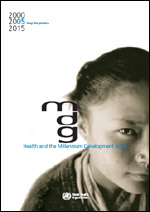
|

Health and the Millenium Development Goals
World Health Organization, 2005
SARPN acknowledges the WHO website as the source of this document - www.who.org
|
|
|
[ Share with a friend  ]
]
|
Contents

Foreword
The eight Millennium Development Goals represent a unique global
compact. Derived from the Millennium Declaration, which was signed
by 189 countries, the MDGs benefit from international political support.
As such, they reflect an unprecedented commitment by the world’s leaders
to tackle the most basic forms of injustice and inequality in our world:
poverty, illiteracy and ill-health.
The health-related MDGs do not cover all the health issues that matter to
poor people and poor countries. But they do serve as markers of the most
basic challenges ahead: to stop women dying during pregnancy and child
birth; to protect young children from ill-health and death; and to tackle the
major communicable diseases, in particular HIV/AIDS. Unless we can deal
with these fundamental issues, what hope is there for us to succeed in
other, equally important areas of health?
2005 is a critical year, with the MDG target date of 2015 only 10 years
away. The evidence so far suggests that while there has been some progress,
too many countries - particularly the poorest - are falling behind in health.
This is likely to affect other areas, including education, gender equality
and poverty reduction. In short, the MDG vision - to create a better and
fairer world - will fail unless we can do more to improve the health of
poor people.
This report explains some of the reasons for the slow progress, and suggests
solutions. It looks beyond the statistics to discuss strategic and policy areas
where change is needed and support should be provided. As such,
it summarizes WHO’s contribution to debates on the MDGs and
to the 2005 World Summit in September.
Much faster progress in health is possible and we have many success stories
to draw on. We have the knowledge and tools, and the resources are
attainable. What is required is political will and commitment to dramatically
scale up our efforts. If we are to succeed, we must start now. Few
challenges are more profound, or more urgent.
LEE Jong-wook, Director-General, World Health Organization
|
|






